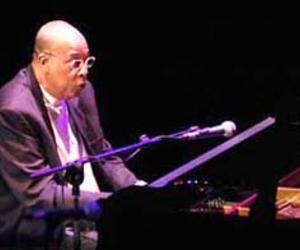Chucho Valdés and the Misa Negra (Black Mass)
- Submitted by: manso
- Arts and Culture
- 10 / 12 / 2010

Misa Negra (Black Mass), the Cuban 9th Symphony, created in 1969 by Chucho Valdés, and played for the first time at Warsaw’s Congress Hall during the Jamboree Jazz Festival, Poland, October 29th, 1970, marked a before-and-after reference in the musical concerts all over the world.
Misa Negra (Black Mass), the Cuban 9th Symphony, created in 1969 by Chucho Valdés, and played for the first time at Warsaw’s Congress Hall during the Jamboree Jazz Festival, Poland, October 29th, 1970, marked a before-and- after reference in the musical concerts all over the world.
That visit to Poland turned out to be the first international tour of the Cuban quintet conducted by Chucho, starting from which the critics began to consider the aforementioned piece one of the greatest contributions to contemporary Latin Jazz.
Immediately, the musician from Havana was classified among the world’s best pianists, together with Oscar Peterson, Herbie Hancock, Chick Corea, and Mc Coy Tyner.
Afterward, the creation of the band Irakere (1973) would come with its international projection in Jazz Festivals in Europe and the United States.
“When I composed that piece and played it for the first time, I already knew what I intended to do, it comprised all the ideas I had developed in the mid of my youth, when I was only 27 years old. I felt the need of talking about the roots, as a result of a deep study of the ancient Yoruba masses. I observed how the original Yoruba masses were, the way in which the slaves used to hold them. I reproduced those roots with my own ideas that were kept very authentically. I’m talking about more than four decades ago.”
The opening couldn’t have been more successful, the musician Dave Brubeck was one of the eye-witnesses, who gave a piece of advice to the Cuban: “Never stop”.
As it usually happens with the Cuban pianists, Chucho used the piano as a drum, with rhythm, with jazz-like and classic harmonies, oriented to the universal.
Nevertheless, many musicologists didn’t understand the composition. “If I hadn’t been very firm, they would have changed my ideas”, the prize-winning pianist said at the time.
Those musicologists used to say that it was neither jazz, nor Cuban music, nor African music; that it was a “monster”.
“I used to tell them that African music and Jazz have the same African roots; they have a lot in common. It is a fusion of the elements that African left in certain places of America, most of all in Cuba and the United States. There’s Chano Pozo, he made a fusion. It may be said that many things that have made their way into jazz by means of Misa Negra and the Cuban piano players, and that was the real success of Misa Negra.”
That’s why he won a Grammy for being the beacon, a starting point into the African roots and the fusion of Jazz music and all the elements. In the United States people talk about salsa music and the Latin Jazz before and after Irakere.
Actually, Misa Negra gave Chucho and Irakere the Award in the category of Best Latin album 1979, for Chucho’s first record under the name of Irakere (Columbia 35625, CBSINC. N.Y., 1979).
The piece has a piano solo acknowledged by the Down Beat magazine as the best from the year 1978. It was precisely there that the Cuban “tumbaos” began to be introduced within the phrasing of Jazz.
From that moment on, it is said that Chucho Valdés has two right hands. “In the fusion of Latin Jazz, I’ve worked with my left hand as a soloist and with the right one as accompanist, but I also switch the terms. My left hand is a singing hand that plays a very important role. I use my hands as if they were two right hands. I make the “tumbaos” with my left hand, while I improvise with the right one. Now I can see that many pianists like Herbie Hancock are doing it, too”.
Translated by: Adriana Pinelo Avendaño
By: Rafael Lam
Source: Cubanow.net
Comments